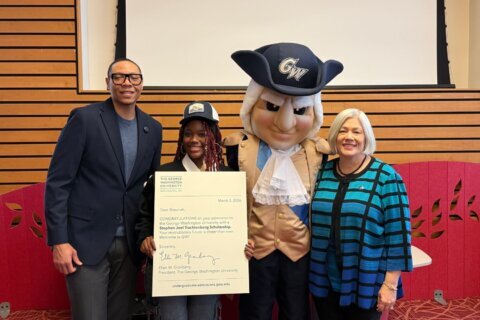Revenue from legalized sports betting in D.C. has fallen short of expectations, in part because gamblers don’t have a lot of options when it comes to placing those bets, according to a Sept. 9 report by the Office of the District of Columbia Auditor (ODCA).
ODCA found that sports gambling in D.C. is largely confined to the city’s GambetDC mobile app. At the time of the audit, the only physical location to place bets was the privately owned William Hill Sportsbook at Capital One Arena, though bettors can also place wagers within two blocks of the arena through the William Hill mobile app.
After sports betting was legalized in May 2019, city officials predicted a tax windfall of tens of millions of dollars.
But between May 2020 and March 2021, when ODCA conducted its audit, the GambetDC app generated just over $440,000 in sports wagering revenue for the city. Meanwhile, the William Hill Sportsbook, despite only being present in one location, netted the city $1.38 million in tax revenue.
The main take-away, according to ODCA, is that the District should build more physical sports betting locations to boost revenue.
GambetDC is run by the Office of Lottery and Gaming (OLG), which is both the regulator and sole operator of sports wagering in D.C.
In its regulator role, OLG grants licenses to private sports betting operators. Up until recently, William Hill was the only licensed operator in the city. The audit recommends that OLG grant additional licenses while also expanding its own retail presence beyond the digital realm, which “would likely increase revenue and benefit the city.”
ODCA also blamed the disappointing revenues on the pandemic, which not only canceled major sporting events, but also deprived the city of commuters and tourists.
“This in turn decreased the number of potential betters, as wagers can only be placed via GambetDC within the District’s boundaries,” the report said.
In its response to the report, OLG also blamed the pandemic for its lackluster performance but said it has implemented “significant enhancements to the sports betting landscape,” many of which align with the report’s recommendations.
That includes creating a stronger retail presence, which OLG said was always the plan but was sidelined by pandemic-related health restrictions.
In July 2021, OLG launched self-service kiosks that allow sports bettors to gamble at small businesses such as Ben’s Next Door, Lou’s City Bar, Takoma Station Tavern and Dirty Water, with plans to expand the kiosks to other establishments.
OLG also said it is granting additional licenses to privately run operators, including BetMGM, which now operates around Nationals Park. FanDuel also has an application pending to open a sportsbook at Audi Field.
But OLG claims that issuing too many licenses doesn’t make fiscal sense, because the costs of regulating private sportsbooks exceeds the licensing fees that the agency gets from those sportsbooks. The District collects 10% of gross gaming revenue from private operators, although that money goes straight to the city, not to OLG.
The agency said it has collected just over $2 million in licensing fees since 2020 — but has spent about $3.6 million to regulate the industry.
OLG said it uses the revenue from GambetDC to make up for the shortfall, which is why the city’s payout is much less than what many had expected. During the audit period, GambetDC generated $5.5 million in “gross gaming revenue” (the money left over after payouts to winners), but only $440,000 of that ultimately went to the city.
OLG has also come under fire for its arrangement with Intralot, the company that won a no-bid contract in 2019 to be the sole provider of the city’s GambetDC app.
Under the arrangement, Intralot gets 42.5% of GambetDC’s gross gaming revenue. That’s actually less than what Intralot gets from other states it works with, including New Hampshire and Rhode Island, but the District also pays Intralot “other direct operating costs” such as marketing and advertising.
The audit suggests OLG renegotiate those terms so that it doesn’t have to pay those costs; OLG said it is reviewing the contract.
The agency has also been criticized for not aggressively incentivizing wagers to lure bettors and for various technical glitches with its app, which rates a dismal 1.6 out of 5 stars on Apple’s app store.
OLG said it is taking steps to improve its app, adding features such as:
- FaceID login;
- Daily promotions that incentivize play;
- The ability to locate a GambetDC retailer location without exiting the app;
- Inclusion in the Google Play Store;
- Revamping GambetDC’s user interface and user experience for easier and faster player navigation;
- Enhancing betting options, such as the introduction of teasers and richer proposition bets;
- Making the logo and imagery more reflective of a sportsbook.








